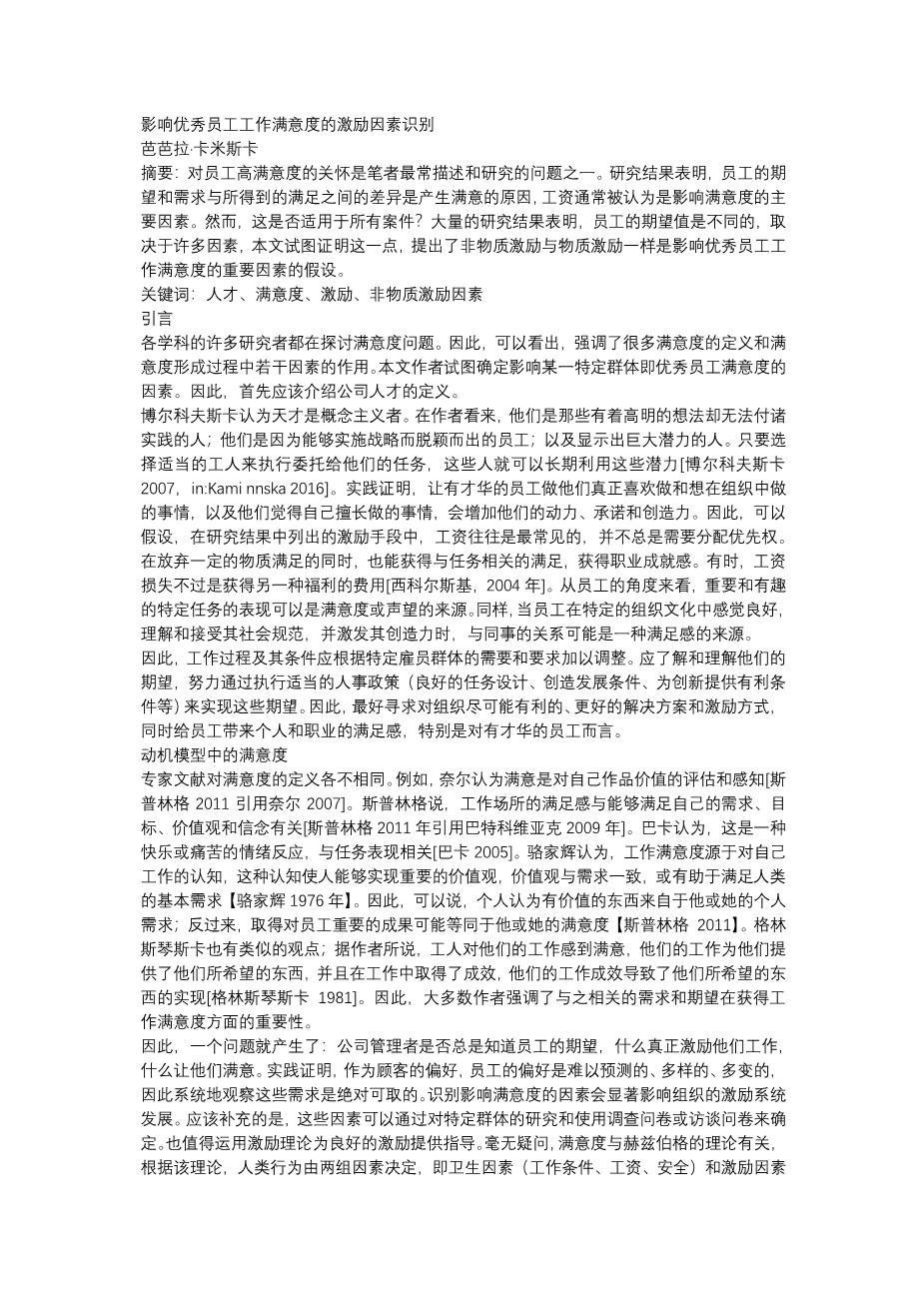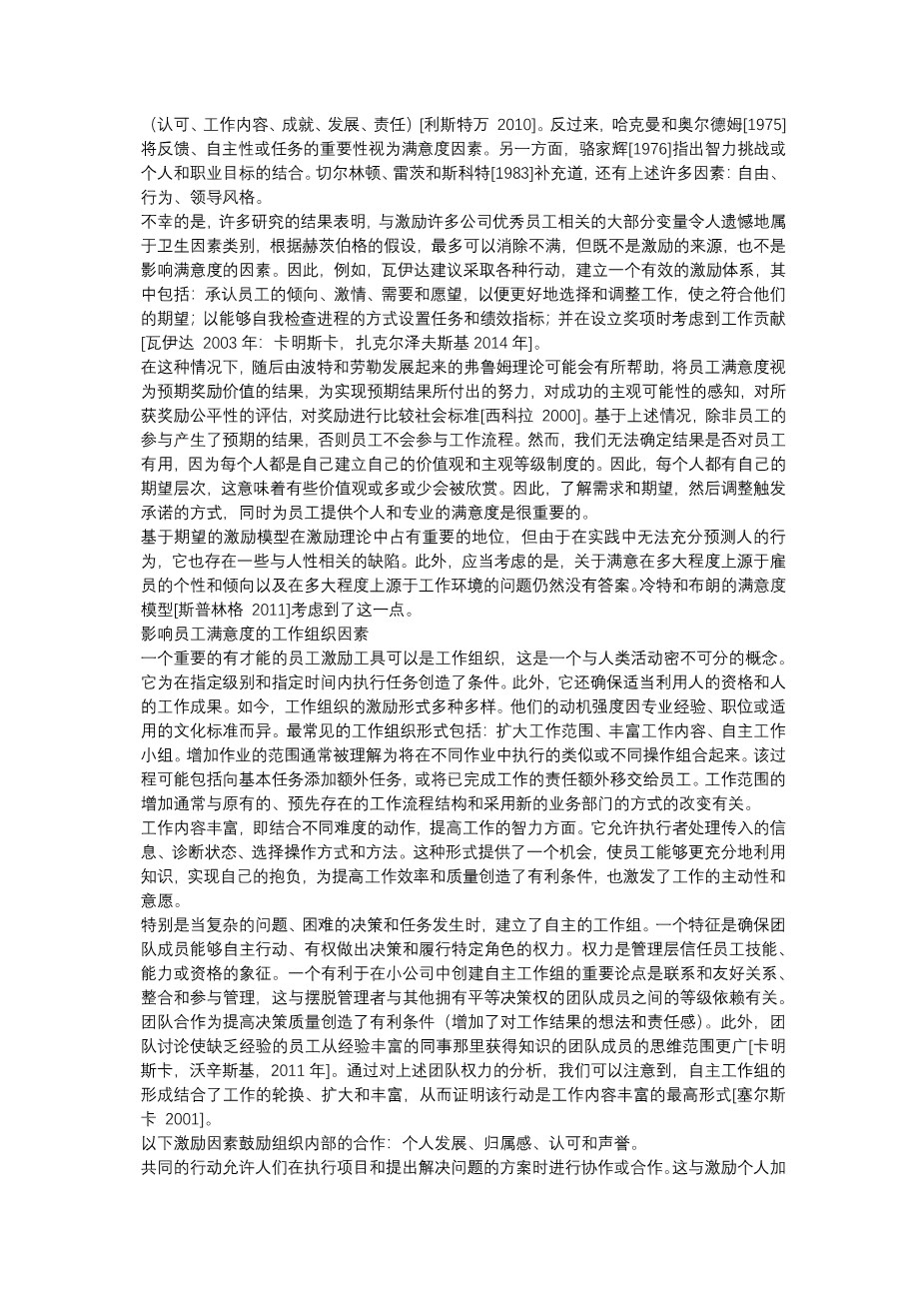Identification of Motivational Factors Affecting Talented Employeesrsquo; Job Satisfaction
Barbara Kamińska
Abstract: The care of employeesrsquo; high satisfaction level is among issues most commonly described and studied, also by the author. Research results indicate that satisfaction arises from the difference between the employeersquo;s expectations and needs and what he or she receives. Salary is usually assumed to be the main factor influencing satisfaction. Does that, however, apply to all cases? Numerous research results show that employeesrsquo; expectations vary and depend on many factors, which the article attempts to prove. A hypothesis was put forward that, along with material means of motivation, non-material ones are an equally important factor affecting talented employeesrsquo; job satisfaction.
Key words: talented employees, satisfaction, motivation, non-material motivation factors
Introduction
Satisfaction issues are addressed by many researchers in various academic disciplines. Hence, as can be seen, there are a great number of satisfaction definitions and the role of some factors occurring in the satisfaction forming process is highlighted. The author of the paper attempted to determine factors affecting the satisfaction of a particular group of workers, namely talented employees. Thus, the definition of talents in the company should first be introduced.
Borkowska considers talents to be conceptualists. In the authorrsquo;s opinion, they are individuals who have brilliant ideas but cannot put them into practice; employees who stand out thanks to their ability to implement strategies; and people demonstrating great potential which can be used in the long run provided that appropriate workers are selected to carry out tasks entrusted to them [Borkowska 2007, in: Kamińska 2016]. As shown by practice, enabling talented employees to do what they really like doing and want to do in the organisation and what they feel they are good at doing increases motivation, commitment and creativity. Hence, it can be assumed that salary, which tends to be most commonly indicated among motivation means listed in study results, does not always need to be assigned priority. While giving up certain material satisfaction, one can achieve task-related satisfaction and gain professional fulfilment. Sometimes loss of pay is nothing else than a cost of obtaining benefits of another kind [Sikorski 2004]. The performance of specific tasks important and interesting from the employeersquo;s point of view can be a source of satisfaction or prestige. Similarly, relations with co-workers may be a source of satisfaction when the employee feels well in a given organisational culture, whose social norms he or she understand and accepts, and which stimulate his or her creativity.
Therefore, the process of work and its conditions ought to be adjusted to the needs and requirements of particular employee groups. Their expectations should be known and understood, efforts should be made to meet those by pursuing an appropriate personnel policy (good task design, creating conditions for development, providing favourable conditions for innovation etc.). Thus, it is advisable to look for better and better solutions and ways of motivation as beneficial as possible to the organisation and, simultaneously, bringing workers personal and professional satisfaction, particularly in the case of talented employees.
Satisfaction in Motivation Models
Satisfaction is variously defined by the specialist literature. For instance, Nair perceives satisfaction as the assessment and perception of the value of onersquo;s own work [Springer 2011 quoting Nair 2007]. Springer states that workplace satisfaction is connected with being able to fulfil onersquo;s needs, aims, values and beliefs [Springer 2011quoting Bartkowiak 2009]. According to Bańka, it is an emotional reaction of pleasure or distress, experienced in association with task performance [Bańka 2005]. According to Locke, job satisfaction results from perceiving onersquo;s own work as such that allows one to achieve important values, with the values being consistent with needs or helping to fulfil basic human needs [Locke 1976]. Therefore, it can be stated that what the individual perceives valuable arises from his or her individual needs; in turn, achieving results important to the employee may be equated with his or her satisfaction [Springer 2011]. Gliszczyńska is of a similar opinion; according to the author, workers are satisfied with their work to such an extent to which their job provides them with what they desire and are effective at work to such an extent to which their work effectiveness leads to achieving what they desire [Gliszczyńska 1981]. Hence, most authors emphasise the importance of needs and expectations associated with them in gaining job satisfaction.
Therefore, a question arises whether company managers always know what their employees expect, what really motivates them to work and what brings them satisfaction. Practice proves that, as those of customersrsquo;, employeesrsquo; preferences are difficult to predict, diverse and changeable, and thus it is definitely advisable to systematically observe those needs. Identifying factors which influence satisfaction significantly affects motivation system development in organisations. It should be added that those factors can be best identified through studies concerning particular groups and using survey or interview questionnaires. It is also worth applying motivation theories providing guidance for good motivation. Undoubtedly, satisfaction is associated with Herzbergrsquo;s theory according to which human behaviour is determined by elements of two groups, i.e. hygiene factors (work conditions, pay, security) and motivators (recognition, job content, achievements, development, responsibility) [Listwan 2010]. In turn, Hackman and Oldham [1975] regard, for example, feedback, autonomy or importance of task
剩余内容已隐藏,支付完成后下载完整资料
英语译文共 5 页,剩余内容已隐藏,支付完成后下载完整资料
资料编号:[607586],资料为PDF文档或Word文档,PDF文档可免费转换为Word
以上是毕业论文外文翻译,课题毕业论文、任务书、文献综述、开题报告、程序设计、图纸设计等资料可联系客服协助查找。
您可能感兴趣的文章
- 通过在消费者心中树立品牌关系导向来提高酒店品牌绩效外文翻译资料
- “友好“抱怨行为:走向亲密的手段外文翻译资料
- 服务蓝图:针对关键服务流程的有效方法-在四星级国际酒店Arash Shahin 管理部进行案例研究外文翻译资料
- 组织中女性高管职业生涯规划与晋升的视角:连锁性别偏见的经验,双重束缚,和不成文的晋升规则外文翻译资料
- 影响优秀员工工作满意度的激励因素识别外文翻译资料
- 探索离职意向的影响因素:以豪华酒店员工为例外文翻译资料
- 新冠肺炎疫情下,中国酒店旅游业面临的挑战与机遇外文翻译资料
- 酒店Twitter账号的营销效果:以沙特阿拉伯为例外文翻译资料
- 酒店旅游市场营销外文翻译资料
- 中国经济型酒店SWOT分析外文翻译资料




